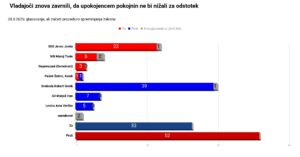By: Peter Jančič (Spletni časopis)
Pensions for retirees will decrease by one percent. Citizens’ salaries will drop even more.
Yesterday, members of parliament from Svoboda, SD, and Levica decided to reject the removal of the one-percent contribution for retirees, employees, and employers starting July 1st. They also refused to legalise the possibility for retirees to care for their family members. The latter rejection is particularly puzzling, given that the government itself admits it cannot find enough workers to care for the elderly. The opposition SDS has repeatedly proposed similar measures to prevent the additional contribution from July 1st and allow retirees to assist the elderly. However, the ruling parties seem to reject opposition proposals even when they are undeniably beneficial.
Until now, retirees did not pay taxes and contributions. The current government introduced a new mandatory healthcare insurance contribution at the beginning of this year, deducting it directly from pensions. The ruling parties’ decision to abolish voluntary health insurance and impose a compulsory state contribution has already hit retirees hard. The government has even raised this contribution from 35 euros to 37.17 euros.
Government MPs insisted yesterday that, despite increasing state spending by billions, they could not find an additional 600 to 800 million euros for elderly care. As a result, they argued that raising taxes and contributions – including this new pensioner levy – was necessary. The vote unfolded as follows:

Not all retirees, however, will have to pay the new contribution. A select group of privileged individuals, who are receiving special merit-based pension bonuses under government policies, are exempt from this payment. These are the same individuals receiving net pensions over 3,000 euros.
Before the vote, SDS MP Andrej Hoivik highlighted this issue: “Today, this parliament has the opportunity to repeal the provision introduced two years ago by Robert Golob’s government, which placed a new tax on the shoulders of retirees, employers, employees, sole proprietors, and farmers – a long-term care tax expected to generate between 600 and 800 million euros annually. At the same time, this same government introduced a law granting extraordinary pension bonuses in the cultural sector for just 0.1% of retirees. And, believe it or not, these privileged individuals will pay only 0.3% in taxes – three times less than the average pensioner, of whom there are over 640,000. (…) Therefore, I invite everyone to participate in the May referendum and vote against these privileges, which will reduce taxes for the elite while burdening ordinary citizens.”
This statement enraged government MPs. Presiding officer Urška Klakočar Zupančič (Svoboda) immediately responded with a misleading insinuation, accusing Hoivik of disliking artists simply because he opposed extravagant privileges. She stated: “You have used your explanation as part of your election campaign, and it is clear you are irritated by these people you mentioned – those with exceptional cultural achievements. They seem to be a thorn in your side.”
Levica’s Vice President Nataša Sukič further escalated the false claim, stating: “Your referendum will not prevent the special pension bonuses for deserving artists; it will only block regulations in this area, which, of course, you do not want. You oppose regulations so that Minister Simoniti, if he returns to office, can once again distribute these bonuses at his own discretion – just as he did in his previous mandates. Because he is the minister who has granted the most such special pensions or pension supplements so far.” Sukič even lied twice, significantly surpassing Klakočar Zupančič in this regard. Ministers do not grant these supplements; governments do. The largest number of supplements was not awarded by Janez Janša’s governments when Simoniti was minister. By far, the most were granted by Janez Drnovšek – hundreds. The N1 portal, known for its left-leaning stance, presented the number of merit-based pension supplements granted under various governments as follows, revealing the extent of Sukič’s false claims:
The N1 review is missing more than a hundred exceptional pensions, which were additionally legalised by left-wing party MPs seven years ago, during the government of Miro Cerar, through the Vilfan Law. This law turned astronomical pension supplements into a legally enforceable right rather than a rarely granted privilege. Under this law, more than a hundred former athletes and sports officials have already received these astronomical supplements – including Vilfan himself, the bill’s proposer. These supplements are indeed granted by ministries, not the government. Sukič conveniently omitted this fact when discussing the largest distributions.
Now, the ruling parties, including Levica, want to extend this broad distribution to cultural figures as well.
And undoubtedly, others will follow in the future.
Why do they lie? The answer is simple: to divert attention from their own actions. While they generously distribute privileges, starting in July, they will also be deducting one percent from pensions to fund Simon Maljevac’s new ministry. Despite governing in prosperous times, instead of saving for harder days, they have inflated spending by several billion. Now, they are missing nearly a billion for those in need. And so, they target pensioners – and everyone else – by raising taxes and contributions, which are already among the highest in the world.